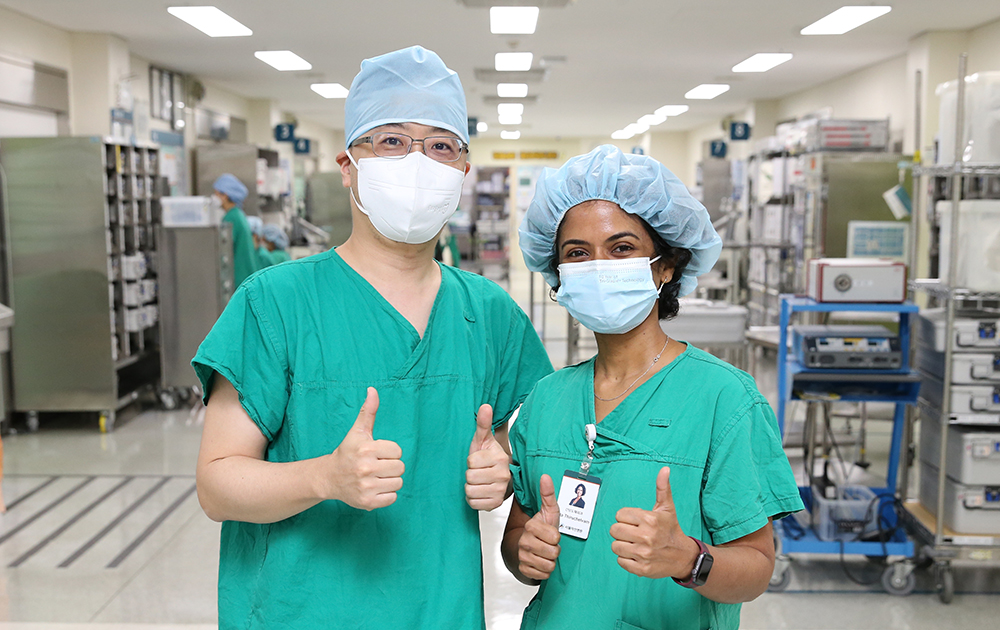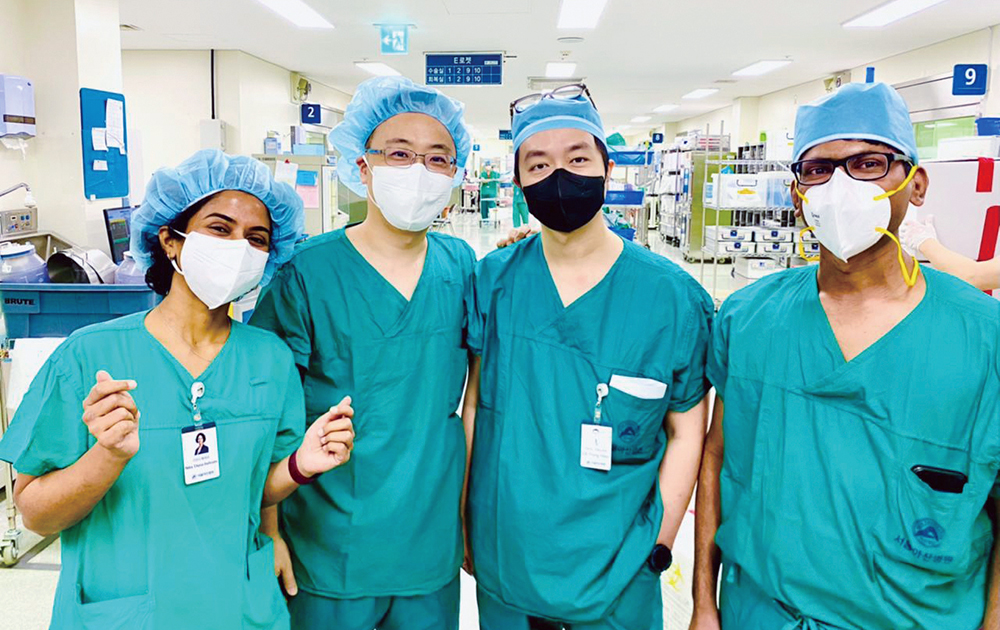-
- Global AMC MENU
- NEWS
- HEALTH
- PEOPLE
- Introduction
Dr. Nita Thiruchelvam from Singapore
 ▲ (from the left) Professor Jae Hoon Lee and Dr. Nita Thiruchelvam
▲ (from the left) Professor Jae Hoon Lee and Dr. Nita Thiruchelvam
Dr. Nita Thiruchelvam specializes in hepatobiliary and pancreatic surgery and works at Changi General Hospital, located in the eastern region of Singapore. Since February, she has been undergoing training under the supervision of Professor Jae Hoon Lee of the Division of Hepatobiliary and Pancreatic Surgery at Asan Medical Center. Dr. Nita Thiruchelvamto shares her experiences and insights gained from her international physician training at Asan Medical Center.
Why did you choose Asan Medical Center for training?
The primary reason for selecting Asan Medical Center (AMC) was the recommendation from colleagues who had personally witnessed and experienced the advanced medical technology available at AMC. The medical staff at AMC actively participates in the HBP Surgery Week, an annual academic conference hosted by the Korean Association of Hepato-Biliary-Pancreatic Surgery. This conference involves presenting various research findings and demonstrating advanced surgeries through live surgery sessions. Colleagues who attended the conference had the opportunity to meet with AMC professors, where they learned about multiple studies and patient cases. They then shared their experiences with me. After learning that AMC is renowned as one of the world’s best institutions in the field of hepatobiliary and pancreatic surgery, which aligns with my specialty, I made the decision to pursue my training at AMC.
 ▲ Dr. Nita Thiruchelvam (first from the left) with Professor Jae Hoon Lee (second from the left) and other medical staff in the operating room
▲ Dr. Nita Thiruchelvam (first from the left) with Professor Jae Hoon Lee (second from the left) and other medical staff in the operating room
What are you learning?
Under the guidance of Professor Jae Hoon Lee from the Division of Hepatobiliary and Pancreatic Surgery, I have been privileged to observe and learn from experts in various surgical fields over the past four months. These include minimally invasive surgery, da Vinci robot-assisted surgery, and surgeries involving vascular reconstruction. One of the notable advantages of AMC is its ability to operate multiple operating rooms simultaneously, facilitating a high volume of surgeries on a daily basis. This exposure to a wide range of cases has been invaluable to my growth and has provided me with firsthand experience in advanced surgeries, particularly in critical care settings.
What are the differences between Changi General Hospital and AMC?
Changi General Hospital, my workplace, primarily provides surgical services for the liver, pancreas, and biliary tract in the eastern region of Singapore. Due to the smaller population compared to South Korea, there are differences in scale, such as the number of patients visiting the hospital and the frequency of surgeries performed. During my training period, my goal is to acquire knowledge and skills from the esteemed professors at AMC and utilize them to elevate the standard of hepatobiliary and pancreatic surgery at Changi General Hospital. By doing so, I aim to provide excellent medical services to patients in Singapore. I would like to express my sincere gratitude to the professors and my fellow medical staff for their support in helping me adapt to the hospital environment and facilitating my training.
 ▲ [left] Dr. Nita Thiruchelvam (in the circle) with other international physicians / [right] Dr. Nita Thiruchelvam at the peak of Mt. Surak
▲ [left] Dr. Nita Thiruchelvam (in the circle) with other international physicians / [right] Dr. Nita Thiruchelvam at the peak of Mt. Surak
How is your life in South Korea?
Although being away from my loved ones presents challenges, I have found joy in forming new friendships in South Korea. At AMC, there are doctors from various countries such as Saudi Arabia, Ethiopia, Thailand, and the Philippines. We often share meals together, engage in conversations, and support one another. On my days off, I take pleasure in hiking in the beautiful mountains that South Korea has to offer. The country's mountainous landscape allows for easy access to breathtaking nature. Furthermore, my appreciation for Korean cuisine has grown significantly. I particularly enjoy dishes like chicken, and recently I had the opportunity to relish tripe and braised spicy chicken, which was absolutely delightful. Although I initially faced challenges with the language barrier, I have made progress and can now read and interpret restaurant names and menus. I hope to further improve my language skills and be able to engage in simple conversations in Korean by the end of my training.












